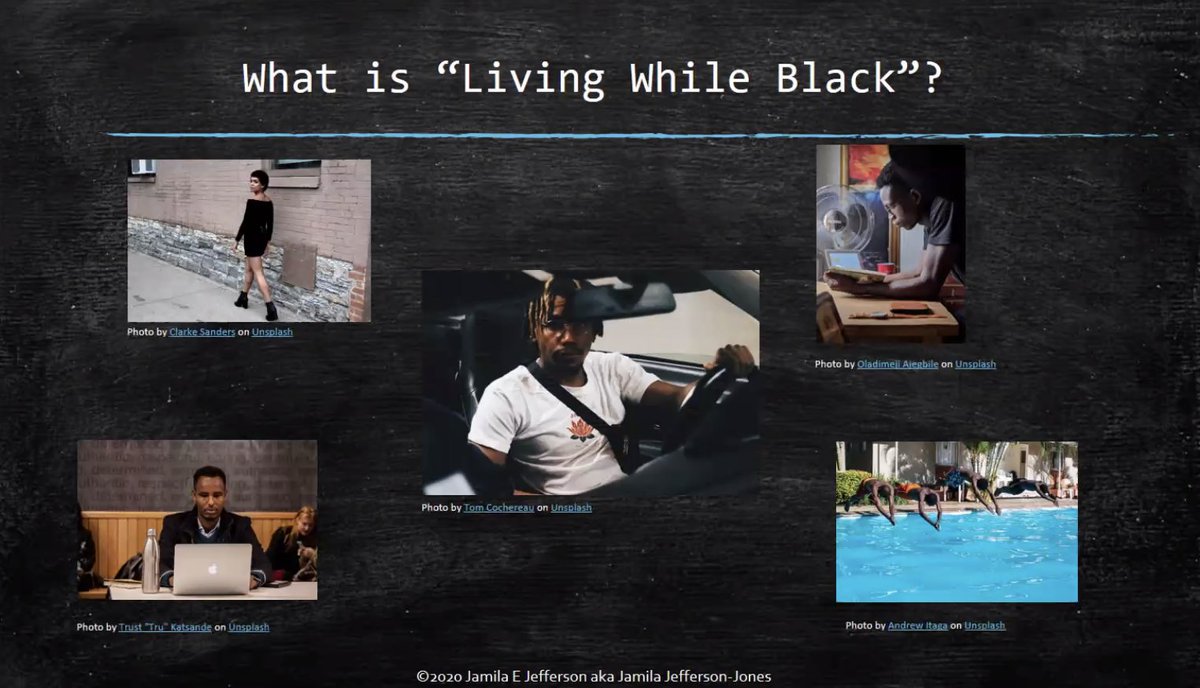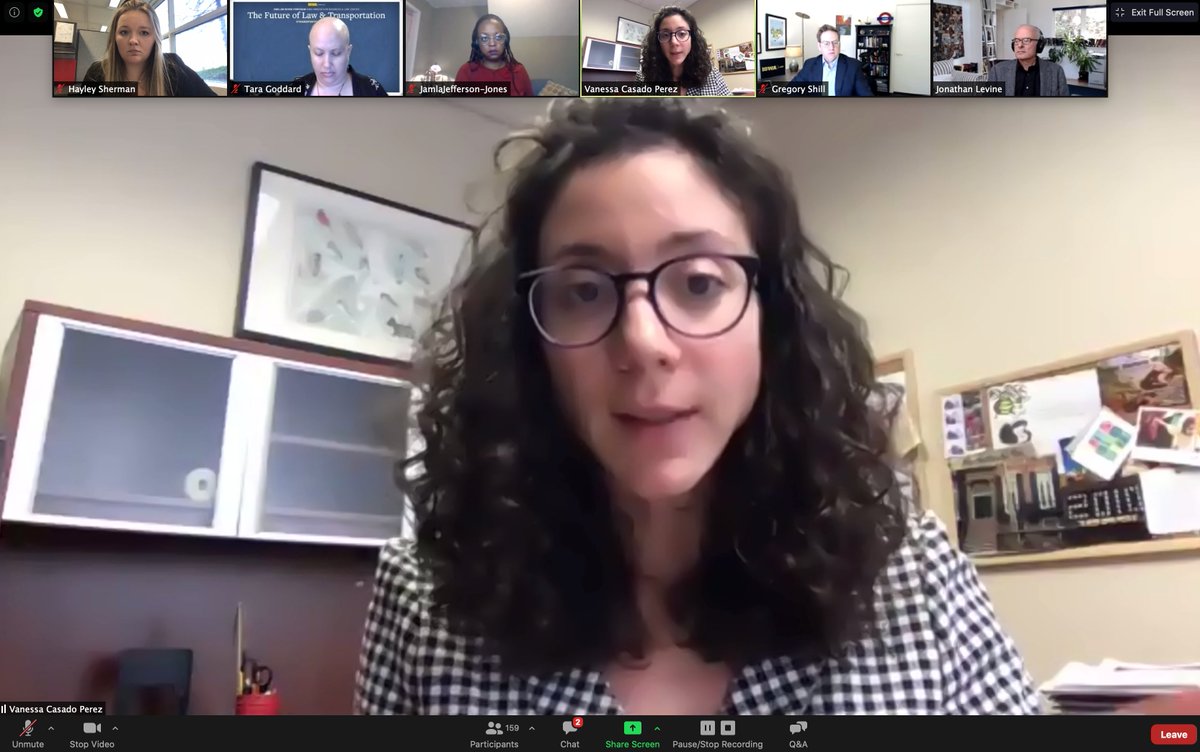
Today's the day! The ILR Symposium on The Future of Law & Transportation will begin at 8:30am central time.
Use this link to access the event: tinyurl.com/Transportation…
Follow along in this thread for live-updates! #TransportationLaw2020
Use this link to access the event: tinyurl.com/Transportation…
Follow along in this thread for live-updates! #TransportationLaw2020

First up today is Professor Jonathan Levine, who will be presenting on “Transportation Policy Entrenchment: Institutional Barriers to Accessibility-Based Planning.” 

Before wrapping up, Jonathan Levine notes that having distinct indicators for accessibility and social justice or environmental goals will best allow making inroads in both areas.
Next up is Professor Audrey McFarlane speaking on “Black Mobility and the Refusal of Funds: Structural Racism and Mass Transportation Decision-Making.” 

Highlighting that stigmas undergird refusals of transportation funding, Audrey McFarlane suggests obligations should attach when funding is awarded. One minimal solution would be requiring evidence-based explanations when funds are later cancelled.
Several legal bases provide support for this, with the covenant of good faith and fair dealing being one example.
Thanks to Jonathan Levine and Audrey McFarlane! Rounding out this panel is Professor Sara Bronin speaking on “Dangerous by Design: How Vehicle and Street Standards Hurt Us.”
Sara Bronin is on twitter @sarabronin 

@sarabronin suggests that best vehicle and street design standards are already well-understood. But ideals of federalism are one example of legal obstacles to these standards being incorporated into law.
@sarabronin highlights representation, liberty, and practicalities of scale as focal points for reform. For example, individuals are not well-represented in the creation of design standards.
Thank you to our first panel! First up in the second panel of the day is Professor David Prytherch, who will be discussing “Mobility Justice and the Public Right-of Way: The Geography of Traffic Law and Design.” 

Next is up in the second panel is Professor Jamila Jefferson-Jones, speaking on “#DrivingWhileBlack as #LivingWhileBlack.” 

Professor Jefferson-Jones first defines what it means to be "Living While Black," highlighting that black individuals have consistently faced restraints on their freedom of movement. 

Noting the history of restrictive movement in the United States, Professor Jefferson-Jones emphasizes that "Driving While Black" is not merely a contextual issue, but rather a property issue with deep roots in the United States.
Next up in the panel is Professor Tara Goddard, discussing “Not ‘Just Semantics’: How the Language and Framing of Transportation Safety Shapes Perception and Practice.”
@DrTaraGoddard
@DrTaraGoddard

@DrTaraGoddard begins by noting that transportation is a public health crisis, noting that the statistics below are updated far too often and questioning who really has the power to transform the transportation sphere. 

In speaking to the results of a study performed on three different groups of individuals, @DrTaraGoddard notes that the individuals were more comfortable with jail time as a punishment for car crashes than impounding the vehicle. 

The final speaker for this panel is Professor Vanessa Casado-Pérez, presenting on “Reclaiming the Streets: Pedestrianization.” 

Highlighting a current issue, Professor Casado-Pérez notes that COVID has shown us that to adequately protect pedestrians we need wider sidewalks and we need to adjust the number/placement of our sidewalks. 

It’s time for our first keynote speaker, Director of Transportation for America Beth Osborne! @BethOsborneT4A 

After explaining how sprawling, car-oriented development leads to more driving, @BethOsborneT4A argues that clustered development can prevent traffic congestion. 

We'll be taking a brief lunch break and will resume with our third panel at 12:45 pm central time!
Join the event here: tinyurl.com/Transportation…
#TransportationLaw2020
Join the event here: tinyurl.com/Transportation…
#TransportationLaw2020

Welcome back to our afternoon panels! First up in our third panel for the day is Professor @ClaytonNall, speaking on “The Road to Inequality and Political Constraints on Legislating a Green New Deal.”
Link: tinyurl.com/Transportation…
Link: tinyurl.com/Transportation…

After conducting surveys to determine how transportation policy issues are viewed in a partisan light, @ClaytonNall found that: (1) both Democrats and Republicans support repairing existing highways; and (2) Democrats are slightly more inclined to support transit.
@ClaytonNall: "Partisan polarization is asymmetric: Republicans are actively anti-urban, but Democrats are not equally pro-urban."
(Below is a cartogram showing vote share in the 2016 election. What a neat chart!)
(Below is a cartogram showing vote share in the 2016 election. What a neat chart!)

Up next is @DeborahNArcher, who will be speaking on “Transportation Policy and the Underdevelopment of Black Communities.”
@DeborahNArcher focuses her scholarship on issues of Race and Inequality, and we are delighted to have her join us to discuss transportation's effect in these areas. 

@DeborahNArcher: "Transportation policy in our nation was built at the expense of black communities and contributed to the underdevelopment of Black America, and still does today."
With examples from St. Paul, MN (I-94); Pittsburgh, PA (I-579); and Orlando, FL (I-4) among others, @DeborahNArcher shares how Interstate Highway construction adversely impacted communities of color.
@DeborahNArcher: In order to move forward, policymakers should undertake a true systemic analysis of transportation systems and policies, including racial justice as a key point of consideration.
Rounding out the panel is Professor @DBRodriguez5, presenting on “Road Wary: Transportation, Law, and the Problem of Escape.” 

@DBRodriguez5 describes transportation's part in allowing individuals to "escape" their locations—relevant during COVID-19, as "staycationers" and "Zoomtowns" have allowed wealthier individuals to "escape" urban locations in favor of suburban and rural areas.
This "escape" problem is not necessarily an issue for transportation law, @DBRodriguez5 explains (free travel is a hallmark of American liberty); but it does present public health and economic concerns.
Economic concerns include the effect on the communities that these travelers escape to, in addition to the communities they leave behind. @DBRodriguez5
How do we solve the potential problems associated with escape? @DBRodriguez5 explains that creating incentives to "stay put" by using traditional public policy tools, such as hotel taxes and tolls, may be part of the solution.
Jump starting our fourth panel of the day is @Suffolk_Law's Professor Janice Griffith, speaking on “Metropolitan Planning Organization: Evolving Roles as Transportation Planning Incorporates Environmental and Sustainability Goals.” 

Professor Griffith explains that Metropolitan Planning Organizations ("MPOs") were originally created by Congress to, in part, help connect growing suburbs to central cities.
MPOs must consider a number of criteria, including economic viability, safety, accessibility, and mobility, among others. 

Professor Griffith: Transportation Planning can't happen in a vacuum—it must be integrated with other critical functions.
Professor Griffith: New considerations (e.g., climate change, among others) may spur evolution in how MPOs carry out their mission in a number of ways: 

Next up is Professor @n_kazis, presenting on “Transportation, Land Use, and the Sources of Hyper-Localism.” 

@n_kazis explains that while transportation and land use law is quite different, the process for approving changes are largely similar.
This similar treatment, that involves obtaining buy-in from the local community via notice, hearing, and approval processes, is not usually required for transportation planning issues—but @n_kazis explains that cities often use the same process for both.
The next speaker in the fourth panel of the day is Professor Kenneth Stahl, discussing “Integrating Transportation Policy into the Land Use Curriculum.” 

Speaking on educating students on transportation policy and incorporating traffic studies into such education, Professor Stahl notes the important differences between legislative processes and quasi-judicial/adjudicative processes. 

Professor Stahl highlights that while traffic studies have both political and legal significance, they may not be always be technically sound.
Our final speaker for the fourth panel is Professor Darien Shanske, who will be speaking on “Subsidizing Sprawl, Segregation and Regressivity: A Deep Dive into Sublocal Tax Districts.” 

Professor Shanske and Professor Neimeier are conducting a study examining the effects of CFDs in the area indicated below. They noted that "these financings are not objectively cheaper." 

It's time for our second keynote speaker, former Secretary of #Transporation Ray LaHood! @RayLaHood
@BAFuture #TransportationLaw2020


@BAFuture #TransportationLaw2020



"Every day in America, Americans get up and . . . they get on some form of transportation. You know what they don't think about? Safety. That's the role of @USDOT ." -@RayLaHood 🚗🚋🚊🚎🚲
"You have to have an administration that is willing to step up. . . . You have to have a priority for safety; when you're on the side of safety, you're on the side of saving lives." -@RayLaHood #TransportationLaw2020
? re: possibility of giving $ for #transportation & #infrastructure projects directly to cities instead of going through state DOTs?
@RayLaHood summarized answer- For big projects you have to have the states & you need the fed. gov. Don't leave out the mayors or governors
@RayLaHood summarized answer- For big projects you have to have the states & you need the fed. gov. Don't leave out the mayors or governors
"There has to be a philosophy & vision that you work with leaders—people in the states & communities who want to get things done." #TransportationLaw2020
First up in our fifth and final panel for the day is Professor Pamela Foohey, speaking on “Bursting the Auto Loan Bubble in the Wake of COVID-19.” 

Connecting transportation and bankruptcy, @PamelaFoohey emphasizes that individuals are often filing bankruptcy claims to keep their vehicles. Further, the market is controlled by car dealers and lenders, making it hard for consumers to set and meet the terms of their deals.
@PamelaFoohey - "The pandemic presents the opportunity to shift the law surrounding transportation. . . . Don't take your eyes off of the automobile market and its inevitable burst."
Rounding out our fifth panel and our FINAL speaker for the day is Professor Randall Johnson, who will be discussing “Why Illinois Should Eliminate Its Video Tolling Subsidy.” 

Speaking on the effect of the video tolling subsidy in Illinois, Professor Johnson notes that each individual is allowed a $9 subsidy. While this amount seems small in the abstract, it cost Illinois around $8 million in 2018.
And that concludes our 2020 Symposium on The Future of Law & Transportation!
We want to extend a heartfelt thank you to all of our participants and everyone who made this event possible - especially @greg_shill!
We want to extend a heartfelt thank you to all of our participants and everyone who made this event possible - especially @greg_shill!
And a final note - recordings of the presentations will be posted on Youtube!
We will post a link to Symposium webpage when they are uploaded: ilr.law.uiowa.edu/symposium/
We will post a link to Symposium webpage when they are uploaded: ilr.law.uiowa.edu/symposium/
• • •
Missing some Tweet in this thread? You can try to
force a refresh





